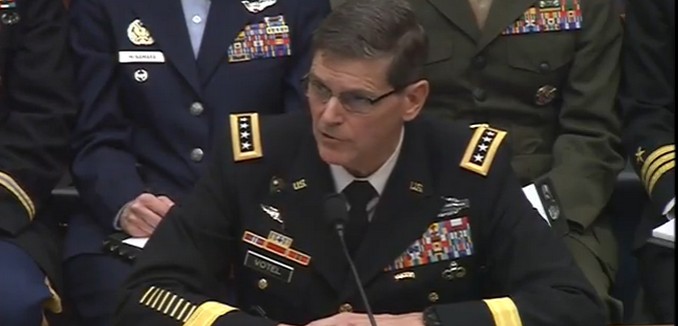Iran “aspires to be a regional hegemon” and remains “the most significant threat” to the United States and its allies, the head of the U.S. Central Command said in a congressional testimony on Wednesday.
Gen. Joseph Votel warned of Tehran’s ambitions in Yemen, Lebanon, the Gaza Strip, and Syria, noting that the 2015 nuclear pact did not quell the Islamic Republic’s territorial aggression.
Votel observed that Iran and its proxies are diligently working to “hinder achievement of U.S. objectives in Afghanistan and some Central Asian States.” Iran is also seeking to undermine Iraq’s sovereignty, exerting influence over most of the 100,000 Shiite militias that comprise the Popular Mobilization Forces, the general added.
While Votel claimed that the nuclear agreement “removed a key threat posed by Iran” in the near term, he indicated that the U.S. may have figuratively won the battle but lost the war. It “is not the case” that the deal has addressed all pertinent threats presented by the Islamic Republic, he stated.
They have a robust theater ballistic missile program, and we remain concerned about their cyber and maritime activities, as well as the activities of Iran’s Islamic Revolutionary Guard Corps – Qods Forces (IRGC-QF) and their network of affiliates.
Countering Iran is challenging, Votel said, as the country operates in a “gray zone,” defined by him as “the space short of conventional conflict where miscalculation can easily occur, leading to escalatory conflict and misunderstanding.” Such examples can be found in the Strait of Hormuz and Bab al-Mandeb Strait, where Iran and its proxies have harassed U.S. ships and planted naval mines, respectively.
An estimated 4.7 million barrels of oil pass daily through the Bab al-Mandeb Strait, which links the Gulf of Aden to the Red Sea. Votel made clear that the U.S. is “prepared to promptly and decisively respond to any threats” by Iran that would threaten free shipping through the critical waterway.
Combating Iran effectively will require “a strong deterrence posture, targeted counter-messaging activities, and…building partner nations’ capacity,” Votel asserted. These steps must be backed with clarity in communication to “ensure the credibility of U.S. intentions.”
“Iran must believe there will be prohibitive consequences if it chooses to continue its malign activities designed to foment instability in the region,” the general added.
Votel’s recommendation of maintaining a tough military posture towards Iran parallels a recent analysis by Tzvi Kahn of the Foundation for Defense of Democracies. Kahn praised recently introduced legislation in both houses of Congress that would target Iran for its non-nuclear threats, including its ballistic missile program, its support for terror, and its attempts to import and transfer prohibited weaponry. Targeting these activities would constitute “a belated attempt to restore U.S. deterrence and call Tehran’s bluff,” he wrote.
Votel’s observations confirm predictions made two years ago by experts as diverse as Foreign Policy editor David Rothkopf; former State Department official Aaron David Miller; Washington Institute of Near East Policy fellows Mehdi Khalaji, Soner Cagaptay, and James Jeffrey; and former Secretaries of State Henry Kissinger and George Shultz, all of whom warned in 2015 that the nuclear deal would stoke Iran’s regional ambitions rather than moderate its behavior.
Kissinger and Shultz, for example, specifically warned that sealing the nuclear deal but failing to address Iran’s aggression would “[risk] empowering Iran’s hegemonic efforts.”
[Photo: U.S. House Armed Services Committee / YouTube ]




